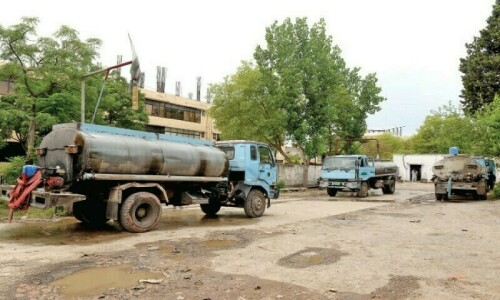SENIOR citizens in Pakistan have recently become visible. Until about two to three decades ago, their lifespan was around less than 60 years.
They have long enjoyed the love, affection and respect of their children and grandchildren. All their needs were met by their families. They were therefore invisible. But now things are beginning to change.
According to World Bank statistics, the world’s population of the elderly has been steadily increasing since 1948 due to declining fertility and increasing life expectancy. The world’s elderly population (60 years and older) reached 251 million in 1950 and 488 million in 1990. It will reach 1,250 million in 2025 — an increase of 146 per cent. Most of the current and future increase will take place in the developing world, in Asia and South Asia in particular. South Asia will experience a dramatic increase in its elderly population by nearly nine times between 2010 and 2025 when life expectancy will increase to 75 years for men and 82 years for women.
In Pakistan, the elderly population is estimated to be 7.2 million and is steadily increasing to about 10 per cent of the population. By the next decade it is expected to rise to about 15 per cent of the population. This means a heavier burden on the younger generation who are duty-bound to care for them. It also means an additional burden on the exchequer. More nurses and medical personnel will be required to care for the elderly.
The western world has vigorously addressed the problem of the elderly since a long time, according to their cultural needs. This has largely resulted in establishing homes for the elderly who are unable to look after themselves. Almost every city and town in the West has such homes in the public and private sectors. The challenge which faces our society now is to find ways and means of providing adequate care to the elderly within the cultural and traditional pattern of our family structures.
In a recent study conducted by the Senior Citizens Welfare Trust, it was revealed that 98 per cent of the elderly population prefer to stay with their families rather than be admitted to homes. The emotional and social satisfaction of being with their children and grandchildren cannot be replaced by the barren atmosphere of homes managed by strangers.
However much we may discourage building homes for seniors, the need for a few still remains unfulfilled. These are the elderly whose children leave them in Pakistan while they go abroad for a better future. There is enough evidence to prove that the children send money to take care of their needs. Yet they need suitable accommodation with assisted living. For them, a condominium-style of building complex is the answer.
No doubt the government cannot do everything and civil society must share some of the responsibilities of caring for senior citizens. Yet some of the services fall within the exclusive purview of the government. Healthcare is one of them.
Studies have shown that children do not abandon their old parents, except when faced with long-term chronic sickness such as dementia, paralysis or Alzheimer’s disease which create an enormous financial and emotional burden. The increasing economic dependency created by the chronic illnesses of the elderly and the rising cost of living prevents children from caring for their parents as much as they would like. For this reason, every government and private hospital should have a geriatric ward where long-term care can be given to the elderly suffering from age-related diseases which cannot be treated at home.
All the elderly do not have to be admitted to hospitals. They can be cared for at home by their families. For them subsidised medicines and home care may be arranged.
Resources from zakat funds should be made available to help indigent families take care of their elderly parents. This will help senior citizens to remain with their families, as is expected in our culture.
Unlike in the West, in our country there is no retirement age or benefits for all citizens. So people keep working for as long as they are able to. People who do retire find themselves lost. Amongst them are teachers, nurses, engineers and craftsmen. It is necessary to mobilise them and use their skills and experience for nation-building.
All over the world, senior citizens are encouraged to join as volunteers in social and philanthropic activities. The field is wide open — social work in hospitals, emergencies, slums, child care, etc.
Loneliness is another problem which seniors suffer from. Their need to share their thoughts with companions of their age group and indulge in useful recreational activities needs to be satisfied. For this purpose, we need to establish day-care services where seniors can avail of library facilities, recreation programmes and organise social functions. Health education, first-aid training, free medical and eye check-ups should also be on the books.
These are some of the challenges which the government and society have to face jointly. This requires political will and an urgent need to plan for the future. At present these problems of the elderly may seem unimportant. But waiting until they become unmanageable will be foolish. The time is to take action now before it becomes too late.
Every year we observe the International Senior Citizens Day by holding seminars, walks and meetings. This is not enough. We must do something concrete which would have long and lasting benefits.
The writer is the president of the Senior Citizens Welfare Trust, Sindh.











































